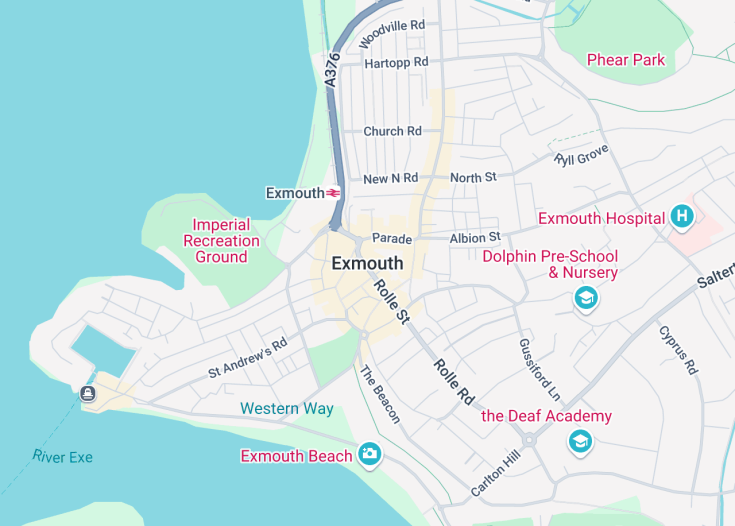Exmouth, a coastal town in Devon, England, presents a scenic gateway with its expansive sandy beaches and historic features. Known for its vibrant watersports scene, visitors can indulge in sailing, kayaking, and kitesurfing here. Its proximity to the Jurassic Coast, a UNESCO World Heritage Site, adds to its allure, offering picturesque walks and fossil hunting opportunities.
The town’s charming mix of quaint shops, local seafood eateries, and traditional pubs encapsulates a quintessentially British seaside experience. Exmouth also acts as a cultural hub with festivals and events celebrating local arts, music, and history throughout the year.
When visiting Exmouth, ensure to explore the Exe Estuary Trail by bike. This route offers exceptional views and a close encounter with local wildlife.
For a unique experience, visit during the Exmouth Festival, a free event that features music, art, and local cuisine, highlighting the town’s vibrant community spirit.
Top things to do & see in Exmouth
Select the following sights and activities to discover best tickets and tours available in Exmouth.
Exmouth: A Coastal Charm
| Country | England (United Kingdom) |
| Time in Exmouth | GMT+0 |
| Language spoken | English |
| Population | 34,432 (source: latest census data) |
| Currency | British Pound (£, GBP) |
| Airports |
|
Exmouth, located in Devon, England, is renowned for its stunning sandy beaches and as a gateway to the Jurassic Coast, a UNESCO World Heritage Site. With a storied history dating back to the Roman era, Exmouth has evolved from a modest fishing community to a bustling seaside town that attracts tourists from around the globe.
Historically significant, the town was one of the departure points for the famed Pilgrims headed to the New World on the Mayflower. Modern-day Exmouth offers a vibrant mix of outdoor activities, water sports, and cultural experiences, including the Exmouth Festival, an annual event filled with music, art, and food.
Where is Exmouth?
Exmouth is situated in the county of Devon in South West England, lying at the mouth of the beautiful River Exe.
Distances:
| Route | Distance by car | Time by car |
|---|---|---|
| London to Exmouth | 200 mi | Approx. 4 hours |
| Bristol to Exmouth | 84 mi | Approx. 2 hours |
| Manchester to Exmouth | 240 mi | Approx. 5 hours |
What is Exmouth famous for?
Exmouth is famous for its stunning sandy beaches and a range of water sports including kite surfing and kayaking. The town serves as the western gateway to the Jurassic Coast, a World Heritage site known for its stunning cliffs, coastal erosion geography, and geological history.
History
Exmouth in England boasts a rich and varied history, tracing its origins back to pre-Saxon times and evolving through various significant phases into the charming coastal town we see today.
Pre-Saxon and Medieval Times (Before 12th century)
Exmouth’s geographical area has shown evidence of human settlement since the Stone Age, evident from various archaeological finds in the region. The town’s significance grew as a port during the Roman occupation of Britain, primarily as a supply line to the larger settlements inland. During the Saxon era, Exmouth served as a small fishing community, which began to develop into a more structured settlement.
The Establishment and Growth (12th century – 18th century)
The official foundation of Exmouth is hard to pinpoint; however, historical records from the 12th century depict a bustling port town. By the medieval period, Exmouth had gained prominence due to its strategic location, conducive to trade and military logistics. The 18th century saw increased development as the town became a popular destination for the gentry and influential figures, including Lady Nelson, the wife of Admiral Lord Nelson.
The Georgian and Victorian Eras (18th century – 19th century)
Distinguished by Georgian and Victorian architecture, Exmouth blossomed into a fashionable resort for the wealthy. It was during this era that many of Exmouth’s beautiful terraces and villas were constructed, many of which remain today as significant historical landmarks. The town also started to see tourism as a major part of its economy during the Victorian period, boosted by the arrival of the railway in 1861.
20th Century Onwards
In the 20th century, Exmouth continued to grow, both as a residential area and as a tourist destination. World War II brought significant change, with many buildings requisitioned for the war effort. Post-war, the town saw modern developments while trying to preserve its historical charm. Today, Exmouth balances its historical heritage with modern amenities, continuing to attract visitors with its picturesque landscapes and historical sites.
Visit Exmouth
What to see and do in Exmouth
Exmouth offers a variety of attractions that cater to both history enthusiasts and nature lovers. Must-visit sites include:
- The Exmouth Beach and Esplanade for scenic walks and water activities.
- The historical Exmouth Museum, which provides insights into the local history and heritage.
- The Maer Local Nature Reserve ideal for wildlife spotting and leisurely walks.
- A visit to the nearby A la Ronde, a unique 16-sided 18th-century house owned by the National Trust.
Annual Events in Exmouth
Exmouth hosts a range of events throughout the year, offering something for everyone. Key events include the Exmouth Festival in May, a vibrant celebration of music, art, and culture; and the Exmouth Kite Festival, held in early Autumn, is a colorful display of kites against the backdrop of the Devon coast.
Best time to visit Exmouth
The best time to visit Exmouth is during the late spring to early autumn months, from May to September, when the weather is warmest and the tourist attractions are in full swing.
Is Exmouth worth visiting?
Exmouth is undoubtedly worth visiting for its enchanting mix of historic charm and vibrant seaside atmosphere.
Whether you’re interested in exploring the rich maritime history, enjoying various outdoor activities, or simply relaxing on the beautiful beaches, Exmouth provides a picturesque escape from the hustle and bustle of city life.










